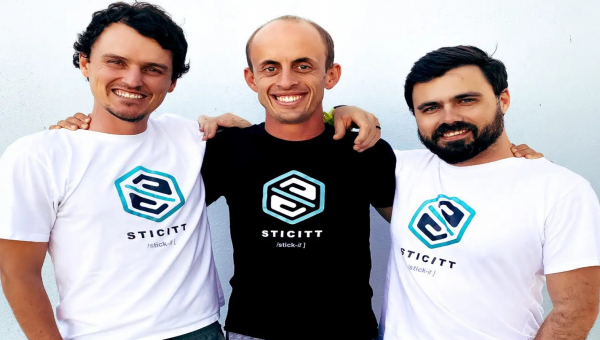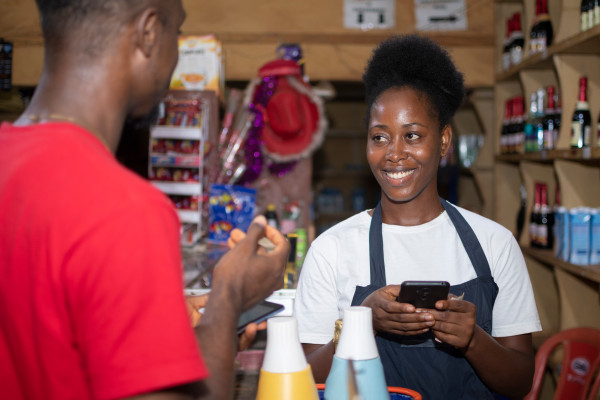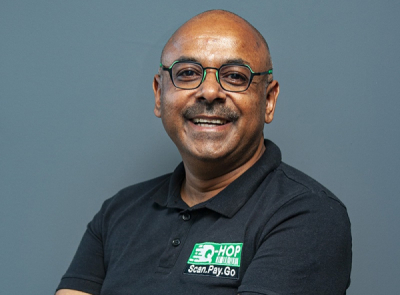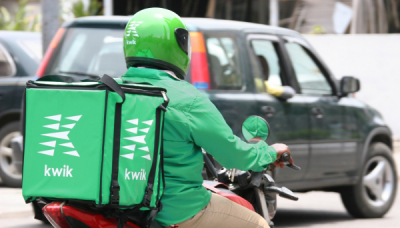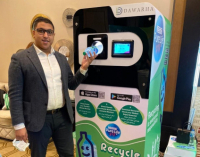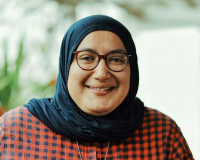In Africa, startups are developing digital solutions to facilitate the daily life of the population. Local startup Sticitt is doing the same in South Africa’s education sector.
South African startup Sticitt launched, in 2018, a comprehensive cashless payment solution, Sticitt Pay, to ease payments in various sectors.
The startup was co-founded in 2017 (according to company insight platform Crunchbase) by Dennis Wevell (photo, center), Mitch Dart (photo, right), Theo Kitshoff (photo, left).
It serves several clients, including lifestyle and golf estates, however, it is renowned for its services in the education sector. It allows parents and students to pay school fees and contributions for school-related activities. Through its communication feature, it also allows parents to track learners’ progress.
According to co-founder and CEO Theo Kitshoff, “Sticitt Pay [...] offers schools an integrated smart payment system that is safe and easy to use and is the first important step in our journey to simplify education-related payments and building toward a youth banking alternative.”
Just after the launch of Sticitt Pay, the three co-founders signed a deal with edtech d6 Group to gain access to a prospective list of 2,000 school clients through the partner’s network.
Currently, the startup claims 791 schools contracted, 97,650 accounts created and 677,096 learners reached. It further reveals that in the first quarter of 2020, it processed transactions totaling US$616,000 for 400 schools.
Its ambition is to add more features to its platform and extend its reach to cover SMEs operating in the education ecosystem. For the founders, the startup is already at the post-revenue stage but it should strive for sustainable growth in the ecosystem.
For that purpose, in March 2022, it completed an oversubscribed seed funding round. The amount raised was not disclosed but, for Sticitt director Dr. Eugene van Rensburg, with the funds, Sticitt will “accelerate its product development, schools deployment and significantly contribute to the upliftment of learners, their parents, and schools.”
Adoni Conrad Quenum
In the past few months, the volume of investments has grown significantly in Africa. However, gender-sensitive issues are not keeping up with the trend. The new funding round aims to reduce the existing gap.
The Women Entrepreneurs Finance Initiative (We-Fi), announced Tuesday (April 26), its fourth round of financing amounting to US$54.8 million. Part of the fund (US$15 million) will go to the African Development Bank's (AfDB) African Digital Financial Inclusion Facility (ADFI) to boost women entrepreneurs’ access to digital technologies and finance in Cameroon, Egypt, Kenya, Mozambique, and Nigeria.
According to Bärbel Kofler, Parliamentary State Secretary of Germany’s Ministry for Economic Cooperation and Development, the fourth round comes at a “crucial time” marked by pressures on women entrepreneurship due to “conflict and insecurity, rising prices and the continuous fallout from the Covid pandemic around the world.”
“I am pleased to see our Implementing Partners preparing such strong proposals to support women-led businesses. Access to technology and financing will be key to unlock the potential of women entrepreneurs,” she said.
The funding round will benefit about 69,000 women entrepreneurs in developing countries, the African Development Bank (AfDB) explains. It will enable the African Digital Financial Inclusion Facility (ADFI) to develop and implement programs to improve access to digital technologies, reduce the US$42 million gender financing gap and improve beneficiaries’ operational efficiency for sound post-Covid recovery.
For Stefan Nalletamby -Director of the Financial Sector Development Department at the African Development Bank Group- the funding will complement the Affirmative Finance Action for Women in Africa Initiative (AFAWA) program.
It will also “be used [...] to broaden access to finance for women, small and medium businesses” and “provide an avenue for their increased economic empowerment and resilience,” he adds.
The We-Fi initiative is a partnership between 14 governments, eight multilateral development banks (with the AfDB as an implementing partner), and various public and private sector stakeholders. As far as the ADFI is concerned, it was launched in 2019 to “catalyze digital financial inclusion throughout Africa with the goal of ensuring that 332 million more Africans, 60% of them women, gain access to the formal economy by 2030.”
Ruben Tchounyabe
Over the past few days, several Central African countries have expressed their intent to elaborate a national cryptocurrency framework. They see those innovative payment mechanisms as a means to create new opportunities and added value.
In the Central African Republic (CAR), the national assembly, last Friday (April 22), passed bill N°22 governing cryptocurrency transactions in the country. The bill officially approves cryptocurrencies as payment solutions in the country and chooses Bitcoin as the reference currency. On April 26, President Faustin-Archange Touadera (photo) praised the bill describing it as a decisive step toward new opportunities.
According to the cryptocurrency bill, economic agents are now required to accept cryptocurrencies as payments for their goods and services. The innovative payment mechanism can also be used to pay for public services and taxes. However, the official currency for accounting purposes remains the CFA Francs (XAF).
In the country, cryptocurrency transactions will be tax-free and official exchange rates will be floating (rates determined by market forces). Likewise, crypto miners are considered independent actors but they are required to report their incomes from such activities.
Crypto transactions will be regulated by ANTE, the newly created agency that will also manage all the ATMs installed by the government across the country.
For some analysts, CAR -which is looking for ways to revive its economy- shouldn’t have passed the cryptocurrency bill without even doing the base works required and addressing crucial issues. In 2020, the International Telecommunications Union (ITU) pointed at the country’s weak legal and technical cybersecurity framework. The government is yet to address that issue because article 18 of the crypto bill informs that legal frameworks and agencies will be created to oversee cybersecurity and personal data protection.
Notwithstanding critics, State Minister Obed Namsio indicates that the cryptocurrency bill marks the beginning of a new phase in the country’s economic revival and peace consolidation plan in line with the government’s agenda, “ which aims for strong and inclusive growth that favors economic development.”
The central bank BEAC is yet to officially comment on the bill. However, the Central African government promises to ensure cryptocurrencies are automatically convertible into the legal tender by creating a trust.
Muriel Edjo
Bode Pedro is the real definition of a serial entrepreneur. With fifteen years of professional and entrepreneurship experience, he has already founded five firms. Yet, given his love for technology and innate curiosity, it wouldn’t be surprising to see him start more businesses.
Nigerian serial entrepreneur Bode Pedro (photo) founded insurtech Casava in 2016 with Segun Makinde. With over 66,000 clients in Nigeria, the insurtech offers digital microinsurance services.
In February 2022, Pedro described his startup’s mission as follows: “provide affordable insurance to Nigerians and Africans in general.” As such, the startup plans to expand its client base, first in Nigeria then gradually expand in Africa.
To finance this expansion, Casava’s founders raised, last February, US$4 million from several investors like Olivier Jung, Tom Blomfield (founder of Monzo), Ed Robinson and Brandon Krieg (founders of Stash), in a round led by Target Global.
Bode Pedro holds a Master’s in Business Administration from Harvard Business School (2020). A few years earlier, he obtained a computer science degree from the University of Baltimore. In 2005, he began his career in the U.S. as the associate director of entertainment firm Amplifyd Entertainement Inc. The next year, he became the director of Transnational Technologies, a U.S based electronics manufacturing firm.
In 2008, Pedro returned to Nigeria and launched Veda Technology, a computer assembly firm. Two years later, he became the boss of online entertainment platform BellaNaija, and in 2013 he founded Tripican.com, a movie ticketing platform. In 2014 and 2016 (the year in which he founded Casava), he founded VisaCover, an insurtech, and online car insurance broker, and Motocheck, a vehicle inspection, and maintenance company in Nigeria, respectively.
Also, since 2021, he is the MD of Rex Credit Company Private Ltd and a member of the board of Octosoft, a healthtech that leverages artificial intelligence for its health solutions.
Melchior Koba
The accounting graduate started in the finance industry but later entered the tech world when the need arose. His choice earned him client recognition as well as clients' and investors’ trust.
South African entrepreneur Ajay Lalu (photo) is the CEO of tech firm Consumption Information Real Time (CIRT), which helps businesses improve operational efficiency with Internet of Things (IoT).
CIRT, which Lalu co-founded in 2018 with Sanjay Soni, has already introduced several solutions in the local market. They include Fridgeloc Connected Cooler, which monitors temperature and remotely controls air conditioning generators, and Q-Hop, which facilitates contactless and cashless shopping.
In January 2021, the IoT firm announced a multi-year strategic alliance to receive “technical guidance, support and access to engineering resources, business development resources” from Microsoft and integrate its solutions to Microsoft Azure.
In March 2022, CIRT’s dynamism in South Africa’s highly competitive business technology market enabled Ajay Lalu to raise ZAR7.2 million (US$460,000) from E Squared Investments to develop its activities, implement pilot projects and grow its development team.
Ajay Lalu graduated from the University of South Africa (UNISA) in 1996 with a BSc in Accounting and started his professional career in the finance and accounting sector. In 2000, he joined Ernst & Young as a corporate finance manager. He continued his professional and entrepreneurship career in the finance sector till 2010 with firms like Utajiri Investment Holdings and Bravura Economic Empowerment Consulting, which he founded in 2006. At the time, he was not much interested in venturing into the tech world since there was virtually no market. In 2010, he joined the sustainable development consulting firm Black Lite Consulting as its MD. Eight years later, while still operating as Black Lite Consulting’s MD, he launched CIRT.
In 2020, he got a professional IoT certification to be able to fully contribute to the success of CIRT client firms.
Melchior Koba
In Africa, a growing number of digital solutions are gradually turning to super-apps offering multiple services.
In 2019, Franco-Nigerian startup Kwik launched an eponymous digital solution that allows users to order products online, pay, and get them delivered in a timely manner. Founded in 2018 by Olivier Decrock, Romain Poirot Lellig, and Yinka Olayanju, the startup successfully completed several funding rounds totaling US$4.2 million to cover the whole of Nigeria.
According to Kwik co-founder and CEO Romain Poirot Lellig, the goal is for the startup “to become the prime app choice for African social vendors and for traditional merchants going digital. Integrating delivery, payment, and e-commerce tool seamlessly in one easy-to-use mobile app is a catchy proposition.”
The digital solution, available on iOS and Android, has several features that allow online store owners to seamlessly manage their businesses. The solution has already been adopted by more than 1000,000 merchants for their businesses’ logistics, commercial and financial needs.
To deliver the orders placed through its app, Kwik uses motorbikes, vans, or rucks depending on the quantity and size of the goods to be delivered. Specifically, goods weighing 25 kilograms and below are delivered using bikes while those comprising between 1.5 and two tons are delivered with vans. Other goods whose weight exceeds those limits are delivered by trucks. With such a fleet, last-mile delivery is easy, fast, and affordable, the startup indicates. For each delivery, it collects 20% of the revenue generated while drivers keep the remaining amount.
By the end of 2022, the startup plans to launch a credit service and increase its merchant base to 800,000.
Adoni Conrad Quenum
In Egypt, there was no plastic bottle collection and recycling system despite the estimated 5.4 million tons of waste generated in the country yearly. To address the situation, Dawarha created a solution that allies mobile apps with AI-based collectors. With the solution, Dawarha collects around 15,000 plastic bottles monthly.
Egyptian tech firm Dawarha is carving its name in its origin country with its artificial intelligence-based plastic recycling machine. For mechatronics engineer Mohamed Kabil (photo), Dawarha CEO and co-founder, the recycling machine is the startup’s contribution to the fight against plastic pollution.
To get the population involved in the fight against plastic pollution, the said solution rewards every user who deposits plastic bottles with bottled water, vouchers or discounts to be used in local stores.
Dawarha also developed an app that allows users to locate the nearest collectors. According to Mohamed Kabil, Dawarha was created to address the lack of sorting and recycling infrastructure in Egypt where an average of 5.4 million tons of waste is generated yearly.
He explains that in Western countries like Germany where he took pre-masters courses, catering companies are in charge of plastic bottle collection via a national deposit system. “... Companies add extra fees to the price of the bottles available for sale at retailers. Customers can [be] refunded the extra fees when returning the bottles at the local shop or retailer,” he stressed.
“This [system] does not exist here, so people tend to be more encouraged to recycle waste when they are rewarded. Therefore RVMs are found to be one of the most effective methods of waste collection and separation from the source,” Mohamed Kabil added.
The research and development enthusiast, who worked from 2018 to 2019 as a researcher at the Micro and Nano Robotics Laboratory at the German University in Cairo, believes that technological innovation has an important role to play in protecting the planet.
In April 2022, he estimated the volume of bottles collected by Dawarha's system monthly to be around 15,000.
Melchior Koba
In Africa, the startup ecosystem is buzzing with all sorts of tech from fintech to healthech and e-tourism. Food delivery startup Elmenus is one of them. With its mobile app Elmenus, it wants to showcase Egypt's culinary specialties.
Elmenus is a digital platform launched in 2018 by the eponymous startup to showcase Egyptian culinary specialties and the restaurants where they can be found. The startup was founded in 2011 by Amir Allam. Between February 2012 and February 2022, it completed several funding rounds totaling US$19.5 million to support its local expansion. Its investors include notable names like Careem and Luxor Capital Group as well as local fund Unicorn Fawry.
According to Amir Allam (photo, center) by investing in Elmenus, investors have approved the startup’s “unique strategy.” “We are accelerating the adoption of online ordering by users while enabling restaurants with new verticals – to help them scale. This funding demonstrates the investors’ strong belief in our position in Egypt, and our capability to dominate the market,” he explains.
The digital platform is available on PlayStore, AppStore, and AppGallery (the app store developed by Huawei). It allows users to easily and quickly order food from more than 6,000 restaurants without making a single call. The user can even track the status of his/her order all through the delivery process. They can pay on delivery with cash or bank cards.
The mobile app has a social sharing feature that allows users to share pictures of the foods they ordered through Elmenus. To access the services, users have to register on the platform, by entering their name, email, and a secure password.
Adoni Conrad Quenum
In Africa, doctor density is below the World Health Organization’s recommendations. To alleviate the issue, startups are developing local e-health solutions.
Waspito is an e-health platform set up by a Cameroonian start-up that connects patients with doctors for live video consultations. Founded in 2020, by Jean Lobé Lobé (photo), Waspito successfully completed a US$2.7 million funding round, in March 2022, to support its growth and expand into Côte d’Ivoire. The seed fund was contributed by notable investors like Launch Africa Ventures, Newtown Partners, and Orange Ventures.
“We are proud of the pool of investors we were able to get on this round. Their experience and network will add value to our team as we continue this journey to solving Africa’s health care accessibility and affordability problem,” said Jean Lobé Lobé commending the investment.
According to the founder and CEO, Waspito plans to enter a dozen countries in the next four years.
The platform offers its services through internet but it also has a mobile app available on PlayStore and AppStore. Users can book consultations with doctors and access a list of available pharmacists and laboratories. The aim is to allow users to quickly get medication or even get them delivered to their doorsteps and perform lab tests after the online consultations. It also has a forum managed by doctors. Through that forum, users can anonymously submit their problems to get help from doctors.
Currently, the platform claims more than 15,000 patients served. In 2020, it was one of the seven winners of Orange Ventures' MEA Seed Challenge.
Adoni Conrad Quenum
Her startup was founded to save Egyptians from her difficult experiences. Combining her digital marketing skills with her passion to serve the population, she developed a mobile app used by 75,000 people in Egypt.
Doaa Aref (photo) is the co-founder and CEO of Chefaa, a healthcare startup she launched with Rasha Radi in 2017. Chefaa allows users to discuss with pharmacists, through a mobile app available on AppStore and Playstore, scan their medical prescriptions to order the drugs they want to buy, and get them delivered to their doorsteps.
Currently, the startup claims 75,000 users in Egypt. To develop its services and enter new markets, Doaa Aref launched a fundraising operation that brought in several investors including Newtown Partners, Global Brain, and GMS Capital Partners. The amount raised was not disclosed but Doaa Aref is confident about the impact the funds would have on Chefaa.
“I believe this venture round is pivotal not because it will only help us scale our validated business models, but because it will also help us capitalize on untapped market opportunities. We are confident Chefaa will dominate over a much larger market share in the next two years,” she said.
Chefaa was created to save users from the tribulations Doaa Aref went through at one point in her life. Indeed, when she was diagnosed with thyroid cancer, she had a hard time traveling to get her medications, as she was living alone, and even accurately following the treatment plan.
"I passed through many problems, I really didn’t know how to handle medicine. And when I got better and started to do some market research I found out that everyone literally has these problems. We need a solution. That’s how I got the idea for Chefaa," she explained.
No one would have guessed Doaa Aref would go into the healthtech industry. In 2008, she graduated from Tanta University with a BSc in Agricultural Sciences. In 2010, she enrolled in Alexandria University where she got her diploma in quality control in 2012. In 2013, she got her MBA in business Administration and Management from the Arab Academy for Science, Technology, and Shipping. Despite her various diplomas, she was more attracted to the marketing world.
From 2006 to 2012, all through her university studies, she held various marketing positions for firms like Mega Trade Co, Radwty For Advertising Services, Just4arab E-Magazine, and Maven Agency For Advertising Services. In 2015, she decided to get proper digital marketing training with the Digital Marketing Training Center, where she got a social media diploma. Up till her sickness and subsequent creation of Chefaa, she held digital marketing positions with Seven Agency, Mnbaa, Speakol, and Stylish Eve, among others.
Melchior Koba
More...
The Port Authority of Douala is set on making digital transformation its choice weapon to improve efficiency, security, and revenues. In that regard, in the past five years, it implemented several projects with more to go.
In Cameroon, the entrance fees generated by the Port of Douala rose fourfold thanks to digitalization. According to Lieutenant Colonel Bertrand Mekinda, deputy MD of Douala Port Security -the firm in charge of securing the Port of Douala- entrance revenues jumped from XAF250 million in previous years to XAF1 billion currently. The revenues may rise further to XAF2 billion yearly when new entrance booths become operational, he estimates.
To digitize the entrance fee collection system, the port created an access badge system for users, the official revealed during a press conference on Friday 15, 2022.
The badge costs XAF1500. It stores users’ information on a server allowing QR code readers to read it when they return . Therefore, users can not resell them once they are within the port and the 24 hours validity period is still on. Unlike the old system that consisted in selling paper tickets, entrance revenues are more secure with the digital system because port authorities now have a clear view of the number of people who access the port during a specific period.
In the past five years, the Port Authority of Douala (PAD) implemented several projects to secure its operations, and improve port security and efficiency. For instance, it installed more than 400 HD video surveillance cameras and built a security task force building that houses a data center and a CCTV operations and control room.
The PAD also plans to buy a management software that will facilitate the digitalization of all the port operations and services. Ten departments are concerned, namely customer relationship management, performance monitoring, incoming and outgoing ships’ management, and cargo tracking.
Ruben Tchounyabe
In Africa, the low bancarisation rate, combined with the digitalization fever, offers a fertile ground for the development of fintech startups.
Yoco is a South African fintech startup co-founded in 2013 by Katlego Maphai, Carl Wazen, Bradley Wattrus, and Lungisa Matshoba. Through its platform, it allows entrepreneurs to accept card payments. In 2017, the startup launched an eponymous mobile app to serve more clients in the local market.
The platform allows Yoco clients to collect card payments but, it also gives SMEs the possibility to get cash advances to develop their businesses, through Yoco Capital. With Yoco Capital, the South African startup aims to help SMEs that are unable to get loans from traditional institutions develop their operations with no worries about deadlines, interest rates, or even defaulting risks and their consequences.
“We understand that accessing capital is one of the hardest challenges faced by small business owners. It's also one of the biggest reasons why small businesses remain small. We continue to offer solutions that leverage smart technology to help small businesses grow,” indicates Yoco co-founder Katlego Maphai.
Yoco Capital is accessible to eligible Yoco merchants only. Within one day, applicants can receive the loans requested. The amounts granted can range from ZAR2,500 (US$160) to ZAR75,000 (US$4,800).
Since its creation, the startup has completed several funding rounds. The latest is a Series C funding round completed in July 2021. During that round led by Dragoneer Investment Group, Yoco raised US$83 million “to accelerate product development.”
In 2021, the startup claimed it had 150,000 businesses in its portfolio with 500 new merchants adding to that portfolio daily. Currently, the startup plans to expand into new African markets. Indeed, 90% of SMEs operating on the continent are small businesses. Yoco’s offers will be highly valuable to African entrepreneurs.
In 2017, Yoco was selected by CB Insights as one of the top 250 financial technology companies in the world.
Adoni Conrad Quenum
Given his training, one would expect Hossam Taher to create a healthtech, not an edtech. However, his choice proved well-founded as he is now trusted by several investors who are committed to the development of ORCAS.
Hossam Taher is a young Egyptian entrepreneur, CEO, and co-founder of ORCAS, a startup that networks parents and students with nearby tutors through its eponymous mobile app.
Founded in 2018, ORCAS allows tutors to offer quality training to students in elementary, middle, and high schools with personalized learning plans and assessments. It is “currently working on growing (..) to become the biggest school in terms of hours taught in the world by operating in developing countries on K-12 students,” as Hossam Taher puts it.
To fulfill its ambition, the startup co-founded by Amira El Gharib successfully raised US$2.1 million, on January 16, 2022, during a pre-Series A round led by NFX Ventures and Access Bridge Ventures.
Thanks to the funds raised, Hossam Taher plans to add more features to ORCAS, attract more talents and expand into the Middle East, North Africa, and Pakistan (this year, it is expected to launch operations in Lahore).
ORCAS was previously CairoSitters. It was founded in 2014, months before Hossam Taher graduated from Cairo University with a BSc in Medicine. From 2014 to 2016, CairoSitters was an “online virtual platform where parents can find, book and manage sessions with high-quality babysitters and tutors.” It was an avenue to offer flexible work opportunities to university students and above all fill the demand for qualified and trusted tutors.
To address the specific needs of every student, CairoSitters was rebranded as ORCAS with more offers. “Learners today have different needs that edtech companies must cater to. For that reason, we have evolved into a learning platform that offers the complete spectrum of teacher-led & self-paced learning environments,” Hossam Taher explains.
Melchior Koba
The barcoding project is one of the 52 projects included in the country’s strategy to boost digital transformation by 2023. Launched in 2021, the project will help boost public revenues and improve the competitiveness of made-in DRC products.
DRC will soon start using bar codes to ensure the traceability of its commercial exchanges. During a workshop organized from April 18 to 20, by the Ministry of Digital Transformation, the national strategy for seamless implementation of that project was validated.
According to Prime Minister Jean-Michel Sama Lukonde, the strategy is the government's commitment to "build a strong, prosperous and united country” by controlling the local production, monitoring commercial exchange data, and efficiently curbing counterfeits.
During the December 24, 2021, ministerial council, Minister of Digital Transformation, Désiré-Cashmir Kolongele Eberande, announced that the DRC obtained its personal barcode prefix (605) that identifies where a product comes from.
"With 605 as the barcode prefix for every product made in DRC, we independently chose to join the global network of countries that implement the bar coding system. We highlighted our country in global supply chains to create a favorable environment for the digital economy,” indicated Prime Minister Jean-Michel Sama Lukonde.
According to the government official, a successful implementation of the national barcoding strategy will make made in DRC products compliant with international standards on security and traceability and boost their competitiveness in local, regional, and global markets.
Ruben Tchounyabe


